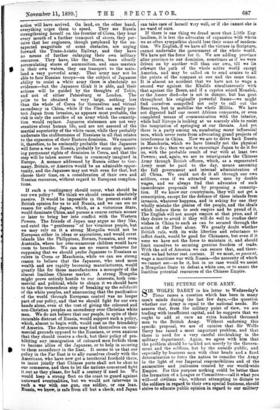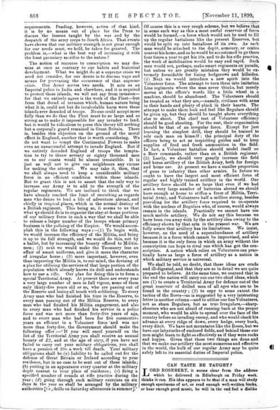THE FUTURE OF OUR ARMY.
SIR WOLFE BARRY in his letter to Wednesday's Times raises a question which has been in many men's minds during the last few days,—the question whether our Army is equal to the national needs. He asserts that, from the military point of view, we are trading with insufficient capital, and he suggests that we ought to add at once an extra hundred thousand men to the British Army. Without endorsing this specific proposal, we are of opinion that Sir Wolfe Barry has raised a most important problem, and that there is need for a very careful stocktaking in the military department. Again, we agree with him that the problem should be tackled not merely by the Govern- ment and the soldiers, but by the outside public, and especially by business men with clear heads and a fixed determination to force the nation to consider the Army in the light of our Imperial responsibilities and of the animosities and Jealousies created by our world-wide Empire. For this purpose nothing could be better than the formation of a League or Committee—call it what you will—of civilians who, without attempting to dictate to the soldiers in regard to their own special business, should strive to educate public opinion in regard to our military requirements. Pending, however. action of that kind, it is by no means out of place for the Press to discuss the lessons taught by the war and by the despatch of the army corps to South Africa. That events have shown that our military strength is not great enough for our needs must, we hold, be taken for granted. The problem is,—what is the best way of increasing it with the least pecuniary sacrifice to the nation ?
, The notion of recourse to conscription we may dis- miss at once as contrary to our habits and historical development. What we might do at a supreme crisis we need not consider, for our desire is to discuss ways and means for preventing the occurrence of that supreme crisis. Our Army serves two needs. It. acts as an Imperial police in India and elsewhere, and it is required to protect these islands, we will not say from invasion— for that we entirely agree is the work of the Fleet—but from that dread of invasion which, human nature being what it is, could not but do incalculable harm were these islands ever denuded of troops. No one could accept more fully than we do that the Fleet must be so large and so strong as to make it impossible for any invader to land, but it would be ridiculous to press this theory till nothing but a corporal's guard remained in Great Britain. There is, besides this objection on the ground of the moral effect in England, another that is worth considering. We do not want to tempt the Continental Powers to make even an unsuccessful attempt to invade England. But if we entirely denuded England of troops the tempta- tion to try to throw seventy or eighty thousand men on to our coasts would be almost irresistible. It is just as well not to give our neighbours any excuse for making the attempt. We may take it, then, that we shall always need to keep a considerable military force in an efficient condition within these islands. But to grant this is not to assert that the only way to increase our Army is to add to the strength of the regular regiments. We are inclined to think that we have already reached the limit of recruiting as regards men elio desire to lead a life of adventure abroad, and chiefly in tropical places, which is the normal destiny of a British regiment. This being so, it seems to us that what le should do is to organise the stay-at-home portions of our military force in such a way that we shall be able to release a larger number of the troops whose primary business is the policing of the Empire. We would accom- plish this in the following ways :—(1) To begin with, we would increase the efficiency of the Militia, and bring it up to its full strength, and we would do this, not by a ballot, but by increasing the bounty offered to Militia- men ; (2) next we would make the Yeomanry less an affair of smart uniforms, and give it more the character of irregular horse ; (3) more important, however, even than improving the Militia is, to our mind, the devising of a plan for utilising the services of that large portion of the population which already knows its drill and understands how to use a rifle. Our plan for doing this is to form a special Territorial Army. At present there are every year a very large number of men in full vigour, some of them only thirty-five years old or so, who are passing out of the Reserve and losing all touch with soldiering. To every Army man who had finished his time in the Reserve, to every man passing out of the Militia Reserve, to every man who had finished his Militia engagement, and also to every man who had finished his service in a police force and was not more than forty-five years of age, and to every man who bad been for five consecutive years an efficient in a Volunteer force 'and was not more than forty-five, the Government should make the following offer :—` If you. will enrol yourself on the list of the Territorial Army you shall receive an annual bounty of .£2, and at the age of sixty, if you have not failed to carry out your military obligations, you shall have a pension of 10a. a week till death. Your military obligations shall be (a) liability to be called out for the defence of Great Britain or Ireland according to your residence, but in no case to be sent out of these islands; (b) putting in an appearance every quarter at tbe military depot nearest to your place of residence ; (c) firing a specified number of rounds at rifle practice during the year ; (d) going through such military exercises on six days ill the year as shall be arranged by the military authorities Fe., drills on Saturday afternoons in summer].' Of course this is a very rough scheme, but we believe that in some such way as this a most useful reservoir of foree would.be formed,—a force which would not be used to fill up the regular battalions like the present Reserves, but would be split up into battalions of its own. As each man would be attached to the depot. armoury, or centre nearest his home, and as he would be accustomed to go there four times a year to get his 10s. and to do his rifle practice, the work of mobilisation would be easy and rapid. Such men would not, perhaps, make smart regiments on parade, but unless we are greatly mistaken they would be ex- tremely formidable for lining hedgerows and hillsides. (4) Next we would introduce a new spirit into the Volunteer force. The attempt to turn them into imitation Line regiments where the man never thinks, but Merely moves at the officer's words like a little wheel in. a machine, should be abandoned. The Volunteers should. be treated as what they are,—namely, civilians with arms in their hands and plenty of pluck in their hearts. The attempt to make them look and feel like Regulars should be given up, but they should be taught above everything else to shoot. The chief test of Volunteer efficiency should be good shooting. For the rest, their organisation should be that of an irregular force. Except for just learning the simplest drill, they should be trained' to rely each man on himself ; the principal duty of the officers being to act as inspiriting guides and to keep supplies of food and fresh ammunition in the field. In fact, a Volunteer battalion should niodel itself on a Boer commando, rather than on a British regiment.
(5) Lastly, we should very greatly increase the field and horse artillery of the British Army, both for foreign and home use. At present we have a smaller proportion of guns to infantry than other armies. In future We ought to have the largest and most efficient force of regular and highly trained artillery in the world. Oar artillery force should be so large that even if we had sent 'a very large number of batteries abroad we should have enough at home to stiffen a force of Militia, Terri- torial Army, and Volunteers half a million strong, besides providing for the artillery force required to co-operate with the nucleus of Regulars who, of course, would always remain in the islands. Practically we cannot have .too much mobile artillery. We do not say this because we have been run away with by the artillery idea owing to the efficiency shown by that arm in the present war. We are fully aware that artillery has its limitations. We insist, however, on the need of a superabundance of artillery because it is a force which cannot be improvised, and also because it is the only force in which an army without the conscription can hope to rival one which has got the con- scription. A nation which relies on Volunteers can prac- tically have as large a force of artillery as a nation in which military service is universal.
We shall be told, no doubt, that these ideas are crude and ill-digested, and that they are so in detail we are quite prepared to believe. At the same time, we contend that in the end the nation will carry out our two chief ideas, which are (1) to create a Territorial Army for defence out of the great reservoir of drilled men of all ages who are to be found in the country ; (2) to copy to some extent the tactics of the Boers—as is suggested by a very interesting letter in another column—and to utilise our fine Volunteers, not as sham Regulars, but as true Irregulars,—sharp- shooters who are not afraid of running back at the proper moment, who would be able to spread over the face of the country before an invading enemy, and who would check his advance at every ridge of r' down, every hedge, every bank, every ditch. We have not mountains like the Boers, but we have our labyrinths of enclosed fields, and behind these our men might learn to fight as effectively as if they were rocks and kopjes. Given that these two things are done and that we make our artillery the most numerous and effective in the world, the bulk of our regular Army may be quite safely left to its essential duties of Imperial police.











































 Previous page
Previous page